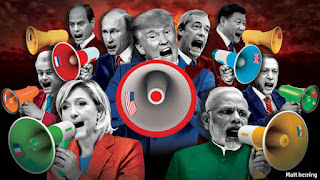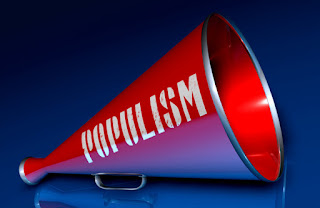People are unaware of the numbers, figures, conditions, reasons, policies and benefits that immigration relies upon and understandably they fear it.
But have Europeans actually engaged and got to know anyone from their country's immigrant community? Just to try and share their concerns with them and see how they are coping in their society, or what do they have to contribute.
More essentially, do we understand why Europe's leaders have chosen apparently the multiculturalism option, rather trying to keep Europe ethnically "European"?
Apart from our continent's colonial legacy, Europe became multicultural because it chose to follow USA in its financial and social policies. After WW2 the European economy was in tatters and so it was forced to copy the American model, that based its economic boom on immigrants from all over the world, including Europe.
One by one, eventually most European nations adopted this model and for many years it proved acceptable and successful. Until the aftermath of the EU 2004 big-bang expansion to the East, combined with the euro-zone and refugee crisis that is.
Now that things got tough, Europeans are reconsidering. But what could be an alternative to multiculturalism? Well another rich, industrialized nation with a complete opposite approach of that of Europe's is Japan.
Currently the country's immigrant population counts for about 1.75% of the total population, when compared with the average 10% that most Western European countries are experiencing.
Nevertheless Japan is also under pressure to accept more immigrants as workforce shrinks. Ageing population and prediction of 8 million fewer workers by 2030 spurs calls for government to accept migrants and refugees. (The Guardian)
The debate of whether the country should loosen its immigration laws is becoming more vocal. Shigeru Ishiba, who is in charge of revitalizing regional economies, stated in 2015 that since Japan’s population is in decline, the government should promote policies that accept immigrants into Japan. “It is wrong thinking that foreigners must not come to Japan," he claimed.
“It is necessary for the government to implement policies that do not cause any discomfort for us or for immigrants in terms of language, customs and other areas,” he continued.
Taro Kono, the minister for administrative reform and head of the national police agency, said that relaxing immigration laws could help President Abe reach his target of boosting GDP from the current 491 trillion yen to 600 trillion yen (5 trillion US dollars) by the end of the decade. (The Guardian)
Some might still think that Japan is a very brave country that stands up for its culture and people, trying viciously to safeguard its way of life. And they will be right. Yet they are not aware fully about the country's economic model, or its citizens' working ethos.
Japan has a welfare system that in some ways makes even the new, dismantled American system seem a model of generosity.
Applicants in Japan are obliged to get help first from their families, and a poor person physically able to work is not eligible for help -- whether or not the person actually has a job.
From some perspectives, this system has worked brilliantly. The country's already strong family ties have been strengthened, and the main safety net is the family rather than the Government. The number of Japanese in the basic welfare program has declined sharply over the last half century, as people became better off and built up savings.
Today only 0.7 percent of the population receives benefits -- compared with the 4.8 percent of Americans who get grants from Aid to Families With Dependent Children or the 9.7 percent who receive food stamps. About 2.3 percent of Americans receive grants through the Supplemental Security Income program, which serves the elderly, blind and disabled.
To be sure, Japan's welfare system operates in a very different milieu from America's. Only 1 percent of Japanese births are to unwed mothers. That compares with a percentage that keeps climbing in the United States and has now reached 30 percent.
Japan also has a far lower percentage of drug addicts than the United States has, a much lower unemployment rate, a much more egalitarian distribution of wealth, a greater sense of family obligation and an abiding sense of shame that colors almost every aspect of life. (New York Times).
Since there can not be single market without the free movement of people, then immigration from within EU is essential to maintain. It supports the "goose that lays the golden egg" for our continent and gives it relatively a competitive edge. No other region has managed to establish the biggest and such a successful market in the globe.
Most EU member states-especially the new ones, could be learning from the mistakes of other countries not repeating them. Sadly, this often is not the case.
From some perspectives, this system has worked brilliantly. The country's already strong family ties have been strengthened, and the main safety net is the family rather than the Government. The number of Japanese in the basic welfare program has declined sharply over the last half century, as people became better off and built up savings.
Today only 0.7 percent of the population receives benefits -- compared with the 4.8 percent of Americans who get grants from Aid to Families With Dependent Children or the 9.7 percent who receive food stamps. About 2.3 percent of Americans receive grants through the Supplemental Security Income program, which serves the elderly, blind and disabled.
To be sure, Japan's welfare system operates in a very different milieu from America's. Only 1 percent of Japanese births are to unwed mothers. That compares with a percentage that keeps climbing in the United States and has now reached 30 percent.
Japan also has a far lower percentage of drug addicts than the United States has, a much lower unemployment rate, a much more egalitarian distribution of wealth, a greater sense of family obligation and an abiding sense of shame that colors almost every aspect of life. (New York Times).
Europeans love their social benefits and they fight for them. As result, our economies need cheap labor which results in higher immigration numbers. Would Europeans accept to work longer with little benefits, to see fewer migrants entering their homelands and safeguarding their culture like the Japanese?
Perhaps we should give them the choice. We could either review our immigration policies and harmonize them across the EU, but we will need a strong leadership to make all member states agree. Or we could leave the governments of each member state decide their own, as it is done at the moment and seems to be accepted with most citizens.
The only problem is, that often EU migrants end up paying the price for each member state's irresponsible immigration policies. Each nation chooses the wrong ones, or implements them for the wrong amount of time, creating divisions among native or EU citizens, versus non-EU migrants. It is an unfair situation for all at the moment, but that is not the immigrants' fault.
Perhaps we should give them the choice. We could either review our immigration policies and harmonize them across the EU, but we will need a strong leadership to make all member states agree. Or we could leave the governments of each member state decide their own, as it is done at the moment and seems to be accepted with most citizens.
The only problem is, that often EU migrants end up paying the price for each member state's irresponsible immigration policies. Each nation chooses the wrong ones, or implements them for the wrong amount of time, creating divisions among native or EU citizens, versus non-EU migrants. It is an unfair situation for all at the moment, but that is not the immigrants' fault.
Since there can not be single market without the free movement of people, then immigration from within EU is essential to maintain. It supports the "goose that lays the golden egg" for our continent and gives it relatively a competitive edge. No other region has managed to establish the biggest and such a successful market in the globe.
In reality our governments are looking to import labor, to be literally exploited by doing the jobs that we don't want, with less money. Because in many cases, these people entered Europe because companies wanted them to come and so they pressurized our governments to change their immigration policies.
Yet when they go bust or they decide to move to another cheaper labor marker, these people are left in limbo, unwanted and with no job. They end up in ghettos, becoming a perfect scapegoat for any populist government.
This should not be the case. We need clear cut, fair and fully functioning, ideally harmonized immigration policies across Europe. For the simple reason that if we should keep our internal borders open, one country's messy decisions on the issue, will inevitably become everybody's problem.
Europe should be looking collectively for the type of migrants it needs, by establishing EU immigration offices abroad, in the countries it seeks to attract migrants from. Essentially before they enter a boat to arrive illegally.
Finally, we should stop terrorizing the native population by scapegoating certain ethnic or religious groups. Recently Heinz Christian Strache, the head of Austria’s far-right Freedom Party, has called for a ban on all Muslim symbols, warning that Islam is a threat to Europe. (New Europe)
If that is what Europeans will decide then fine. But will they also ban Muslim doctors, waiters, nurses, small shop keepers that save lives, attend patients, and are staying up late in the convenience stores during Christian holidays, so Europeans can find things that forgot and ran out of, at any time?
Yet when they go bust or they decide to move to another cheaper labor marker, these people are left in limbo, unwanted and with no job. They end up in ghettos, becoming a perfect scapegoat for any populist government.
This should not be the case. We need clear cut, fair and fully functioning, ideally harmonized immigration policies across Europe. For the simple reason that if we should keep our internal borders open, one country's messy decisions on the issue, will inevitably become everybody's problem.
Europe should be looking collectively for the type of migrants it needs, by establishing EU immigration offices abroad, in the countries it seeks to attract migrants from. Essentially before they enter a boat to arrive illegally.
Finally, we should stop terrorizing the native population by scapegoating certain ethnic or religious groups. Recently Heinz Christian Strache, the head of Austria’s far-right Freedom Party, has called for a ban on all Muslim symbols, warning that Islam is a threat to Europe. (New Europe)
If yes, then maybe we should limit immigration from Islamic nations. But we can not encourage people to come over here to fill jobs that we need, yet don't allow them to practice their religion. Unless of course we want them to be forcibly converted or live in the shadows of our society as pariahs.
However oppression breeds resistance,clashes and a divided society full of hatred and inequality. There is no reason why we should see our capitals' streets, ending up like many of those in America when we can prevent it, by being fair, open and honest.
However oppression breeds resistance,clashes and a divided society full of hatred and inequality. There is no reason why we should see our capitals' streets, ending up like many of those in America when we can prevent it, by being fair, open and honest.













